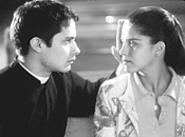Christ is sexy. There, got your attention. But honestly, think about it: nice guy, pretty hair, carpentry skills, puts loaves (and fishes) on the table. Plus all that doing miracles and rising from the dead and being the Son of God business. Heck, He'd be a prime catch for any gal. That's heresy for some, sure, but The Man himself might just giggle at the concept and go back to healing lepers, no offense taken.
It is the essential sexiness of the holy archetypes that stirs up a ruckus in The Crime of Father Amaro (El Crimen del Padre Amaro), adapted by screenwriter Vicente Lenero from the 1875 book by Portuguese author Jose Maria Eça de Queiroz. We first meet our present-day protagonist Padre Amaro (Mexican superstar Gael García Bernal, of Amores Perros and Y Tu Mamá También) on a coach ride through the Mexican countryside, and before you can say, "the body of Christ," we know who he's working to imitate. Though only 24, the devoutly Catholic Amaro shows great patience when the bus is raided -- almost as a matter of course -- by armed banditos, and he illustrates deep compassion by giving his money to an elderly fellow picked clean by the robbers. Before Amaro even sets foot in the little town of Los Reyes, his benevolence is confirmed.
There is a wickedly funny scene early on in which the somber, almost scary icons of Amaro's new parish church are scrutinized while old crone Dionisia (the show-stealing Luisa Huertes) wails hymns like a mad banshee, but otherwise we're shown that the dewy priest has serious work ahead of him. The local clergy aren't exactly prone to sitting around together contemplating the Divine; rather, they've created their own specific sacraments. First to greet Amaro is aging Father Benito (Sancho Gracia), who has been worshiping secretly at the proverbial altar of his housekeeper, Sanjuanera (Angelica Aragon), for time out of mind. There's also wild man Father Natalio (Damian Alcazar), whose rugged, mountainside parish shelters outlaws and conceals any number of dirty deeds, leading to the thorough disgruntlement of the region's corpulent Bishop (Gomez Cruz). Despite Amaro's high hopes, he can't help noticing a little dirt on the local men of the cloth.
Those elements alone could be the makings of a nice little western, but the crux of the movie -- and of de Queiroz's still-relevant story -- is that Amaro, sworn by his profession to celibacy, is inflamed with passion. Since Catholic (the religion) translates approximately to "don't have a good time ever, and if you do, be certain to be miserably ashamed," and catholic the adjective means simply "universal," Amaro's passion (in the original sense of the word, meaning literally "suffering") is pretty much guaranteed. Despite his pure desire to sow the seeds of love, Amaro has a wide world of wild oats to cultivate as well.
The catalyst for both the plot and the young priest's difficult meditation on faith and flesh is pretty little 16-year-old Amelia (22-year-old Ana Claudia Talancón), daughter of lusty Sanjuanera and destined to follow fairly closely in Mama's footsteps once she meets Amaro. Although she has a beau in coarse, uppity journalist Rubén (Andrés Montiel) -- whose father Martin (Gastón Melo) digs more dirt than the alternative press on the Catholic Church -- Amelia is too turned on by her religion to avoid relishing hottie Amaro conducting Mass beneath the dangling Messiah. As the quickest way to a man's heart is sometimes through his erectile tissue, she invites Amaro's advances via the confessional, where she daintily reveals her practice of touching herself to thoughts of Jesus.
Director Carlos Carrera (Un Embrujo) employs very little stylistic gloss to tell his purposefully inflammatory story, instead relying on the innate gifts of his talented cast. Bernal is ideal as Amaro, displaying great skill in mixing up his selfish interests with those of his station, and Talancón executes a thoroughly convincing turn, mingling youthful desire, spirituality, and confusion. The story may seem obvious for some, but the actors deliver it with mucho gusto.
Of course, the real story here is that the movie -- much like The Exorcist and The Last Temptation of Christ and even Dogma before it -- is prompting protests from Catholics, who deem it blasphemous (regardless of whether they've actually seen it). Fair enough; whenever the mythology underlying a culture's belief system is challenged, it's going to raise hackles (and certainly, the entertainment industry gets off on that). But the simple fact is that Father Amaro is a competent if unremarkable tragedy that happens to exploit a few volatile symbols (offertory wafers, the Virgin of Guadalupe) to hook you, while it exposes the dangers of both patriarchal religion and hypocrisy.










